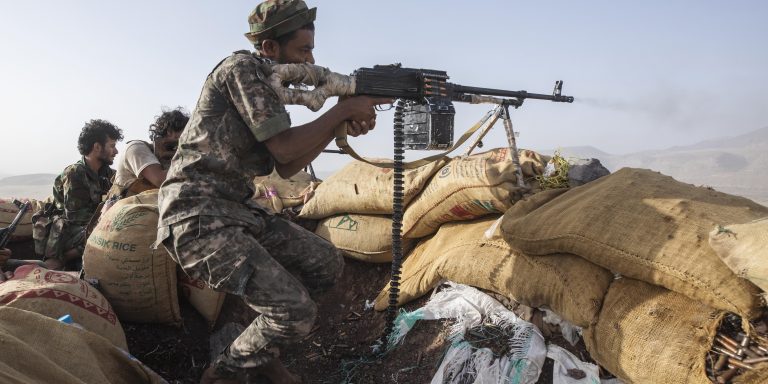INTELBRIEF
January 31, 2022
IntelBrief: Yemen Conflict Drags on and Broadens Amid Houthi Setbacks

Bottom Line Up Front
- Recent battlefield setbacks for the Iran-backed Houthi movement could convince the opposing Saudi-led Arab coalition that a military victory is still possible.
- Earlier Houthi advances around Marib may pressure Saudi Crown Prince Mohammad bin Salman (MbS) to accept a political settlement favorable to the Houthis.
- Saudi Arabia and its partner, the United Arab Emirates (UAE), see the war against the Houthis as part of a broader struggle against Iranian influence in the region, including in Lebanon.
- The Houthis are expanding the war by launching missile and drone attacks on the UAE, attempting to drive the Emiratis out of the Yemen conflict.
During January, the Saudi-led Arab coalition supporting the Republic of Yemen Government against the Iran-backed Houthis achieved significant and unexpected battlefield breakthroughs that might shift the calculus of the various stakeholders in the conflict. In 2019, with the war effort faltering and bringing unprecedented international criticism over civilian casualties the United Arab Emirates (UAE), a key actor of the coalition, pulled back its ground forces from the main fronts around the key port of Hodeida. With Saudi forces deprived of substantial UAE ground capabilities, by mid-2021, Houthi forces appeared poised to capture the central province of Marib, a victory that would have virtually sealed defeat for the Saudi-UAE coalition. Prince Mohammad bin Salman (MbS), who had intervened in 2015 predicting victory within “weeks,” was widely urged to recognize failure and accept a significant Houthi role in a reconstituted Yemen government. Yet, despite some limited ceasefires and prisoner exchanges with the Houthis, MbS and UAE de-facto leader Mohammad bin Zayid Al Nayhan (MbZ) consistently refused a broader political compromise. The acceptance of a settlement would have been seen as a humiliating development for both leaders, but also force them to acquiesce to a further expansion of Iranian regional influence - a factor always central to Riyadh and Abu Dhabi. The two assembled the Arab coalition in 2015 against the Houthis with the stated purpose of “rolling back” Iran’s success in gaining de-facto control of several “Arab capitals” - referring to Beirut, Damascus, Baghdad, and Sanaa, the capital of Yemen that the Houthis seized in 2014.
Not convinced that the war was lost, the UAE re-engaged in the fighting and the Saudi-UAE partnership was reorganized. In early January, a UAE-supported Yemeni armed formation called the Giants Brigade was redeployed to the Marib battle and succeeded in ousting the Houthis from the southern province of Shabwa. That victory constrained vital Houthi supply lines around Marib and, in subsequent weeks, after being backed by large-scale Saudi and Emirati airstrikes, advanced further. In late January, pro-government forces seized control of most of the district of Hareb, including the town of Hareb, possibly ending any possibility for the Houthis to capture Marib.
The implications of these unexpected successes for the Arab coalition – and for the broader region - are significant. One near-term consequence arrived in the form of Houthi missile and drone attacks on UAE territory, some of which were reportedly intercepted by U.S.-supplied missile defense batteries. Houthi leaders acknowledged their responsibility for the attacks, using language similar to that used by their backers in Tehran - asserting that the lavish glass buildings in the UAE are easy targets. The Houthi strikes appeared to constitute a deliberate effort to force the UAE to withdraw from the Marib fronts, if not from the conflict entirely. The missile attacks indicated that the battlefield setbacks would not compel the Houthis to accept a settlement on Saudi-UAE terms, but rather to respond by widening the war outside Yemen itself.
How MbS and MbZ might adjust their strategy in Yemen as well as in the broader region remains a critical question. Neither leader will view the battlefield advances as an opportunity to settle the conflict on favorable terms. Rather, judging from their past behavior, both leaders will see the military successes as justification for their rejecting compromise proposals and a basis to pursue the conflict until victory. The two Gulf leaders might find backing in the January 27 comments by Brett McGurk, the U.S. National Security Council’s coordinator for the Middle East and North Africa, who stated: “Over the last year, the Saudis have supported U.N. initiatives…to wind down the war. The Houthis have answered those initiatives by launching a massive offensive inside Yemen...It takes two to get to a ceasefire and end the war and right now the onus is on the Houthis.”
Reflecting the Saudi intent to use its Yemen victories to press against Iranian regional influence elsewhere, MbS initiated an attempt to force Lebanese leaders to break decisively with Hezbollah - Iran’s closest and most powerful regional ally. MbS undoubtedly engineered the late January announcement by his main ally in Lebanon, former Prime Minister Sa’d Hariri that he will not run-in upcoming Lebanon parliamentary elections because of Iran’s influence there, something he had also been reportedly urged to do in 2017 during an unusual stay in Saudi Arabia which warranted much consternation. MbS and his allies subsequently orchestrated a Gulf state initiative - unlikely to succeed - to compel Lebanese leaders to disband Hezbollah outright. Some experts fear that success in Yemen might prompt MbS to return to the violent erratic behaviors he has exhibited in the past. Notable examples include the October 2018 killing of Saudi dissident journalist Jamal Khashoggi at the Saudi consulate in Istanbul and, jointly with MbZ, the isolation of Qatar during 2017-2021. No matter what MbS and MbZ decide, Iranian leaders - who are no more interested in Yemen compromise than the two Gulf leaders are - will respond to the Houthi setbacks in ways that might again alter the battlefield and complicate the options available to the various combatants.